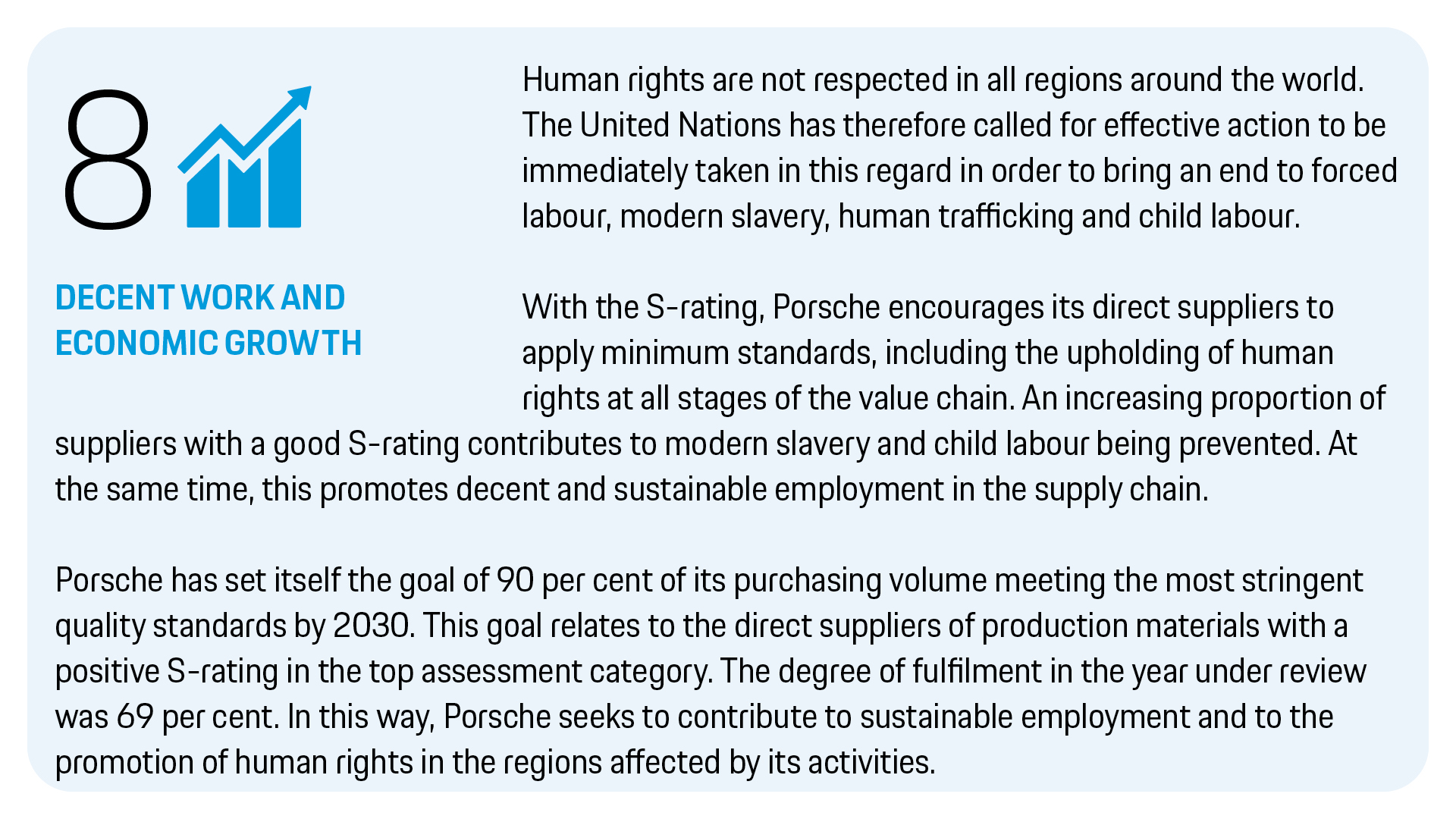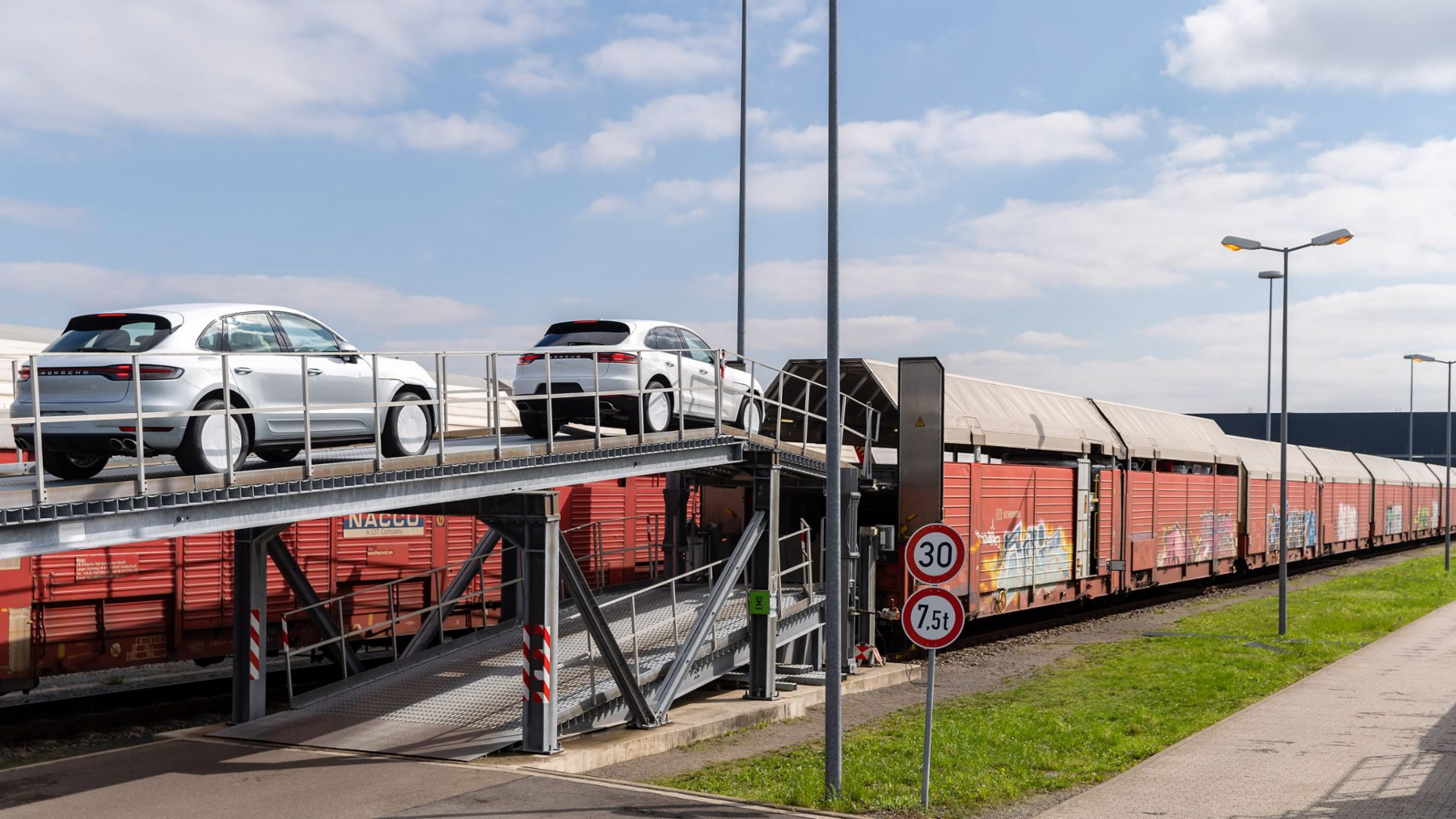
Commitment to sustainable employment and the promotion of human rights.
Porsche’s corporate responsibility does not end at the factory gates – it extends across the entire value chain. With the expanded product portfolio and the new technologies used, the supply chain is becoming increasingly important. Porsche is therefore systematically focusing its strategy on the continuous management of its supplier relations in terms of sustainability aspects. The sustainability assessment of its direct suppliers has been a binding criterion for the awarding of contracts since the introduction of the sustainability rating (S-rating). It helps to safeguard sustainable procurement, compliance with human rights standards and employment practices, and responsible resource management among the suppliers. The materials used are also to be systematically analysed as the current projects are continued together with the Volkswagen Group. Here, Porsche looks for potential risks in relation to material origins, production conditions or
raw material extraction.
Safeguarding of human rights and environmental protection in the supply chain
The S-rating is a mandatory award criterion for all direct suppliers.
Porsche’s supply chain is becoming more and more important. The key factors contributing to this are economic success, the expanded product portfolio and the technologies applied. At the same time, the volume of supply parts is increasing due to higher delivery figures and the procurement of innovative components.
Protection of human rights
Porsche endeavours to make its supply chain resilient by adopting a responsible and cautious approach. Following Porsche’s integration into the Volkswagen Group, much of its Purchasing division was incorporated into the Group’s procurement structure, with the existing structures and processes being adapted accordingly. Porsche closely coordinates and agrees on its contract awarding decisions with the Volkswagen Group.
Porsche is aware of its position in the supply chain. The company rejects child labour, forced labour and compulsory labour as well as all forms of modern slavery and human trafficking. Contractually binding sustainability requirements for direct suppliers can be found in the Code of Conduct for Business Partners and serve as the basis for responsible supplier management. This also and in particular relates to the upholding of human rights.
Along with the Volkswagen Group, the company is actively engaged in industry dialogue on the German federal government’s National Action Plan for Business and Human Rights. The aim here is to establish decent labour conditions throughout the supply chain. Via the Volkswagen Group, Porsche is also a member of the World Economic Forum’s Global Battery Alliance. Featuring public and private partners along the entire battery supply chain, the Global Battery Alliance strives to promote social and ecological sustainability throughout the whole value chain of the raw materials used in batteries.
Porsche developed a human rights due diligence management system in collaboration with the Volkswagen Group in the year under review. The purpose of this is to systematically analyse, prioritise and reduce human rights risks in the supply chain. A key measure here is extensive training and capacity building for the direct suppliers, in particular in countries and regions where there is a higher risk of human rights violations.
Demanding sustainability from suppliers
Trust-based cooperation between Porsche and its direct suppliers is based on shared values and clear sustainability requirements as defined in the Volkswagen Group. The concept of sustainability in supplier relations and the Code of Conduct compel all parties to observe environmental, social and human rights standards. These are founded on the International Chamber of Commerce’s Charter and the OECD’s guidelines. The relevant core labour standards of the International Labour Organization (ILO) serve as the foundation for the sustainability requirements.
All suppliers are also expected to follow the OECD Due Diligence Guidance for Responsible Supply Chains of Minerals from Conflict-Affected and High-Risk Areas. Porsche is active here together with the Volkswagen Group within the Responsible Minerals Initiative and the Responsible Mica Initiative. The sustainability requirements are enshrined in supply contracts. If these are not complied with, contractually agreed steps all the way up to termination of the business relations are initiated.
Implementation
Sustainability is a core component of Porsche’s contract awards. The company has established its own team within Procurement which is responsible among other things for rating the sustainability performance of direct suppliers.
Porsche always conducts integrity checks before entering into business relations with new partners. Since the introduction of the sustainability rating (S-rating) in 2019, sustainability has been a mandatory award criterion for all the direct suppliers of production materials. This also applies to suppliers in other areas based on risk. The company’s checks include verification of social and environmental risks, as well as compliance including ethical conduct. When awarding contracts, sustainability is placed on an equal footing with other criteria such as cost, quality, technological capabilities and logistics.
As a first step in the S-rating process, (potential) direct suppliers must submit a self-declaration on defined sustainability criteria using a standardised questionnaire that has become established in the automotive industry.
If the results of the questionnaire are not satisfactory, a second on-site inspection is carried out by an independent sustainability auditor. If any concerns are raised, the supplier is given a negative rating. In collaboration with the supplier, a Corrective Action Plan is initiated. Based on this, the identified risks must be quickly remedied. Implementation of any measures is subject to central verification. The affected suppliers are not considered for further contracts until they comply with and meet the sustainability requirements.
In total, 1,796 direct suppliers had submitted a questionnaire up to the reporting year. Of these, 657 underwent on-site audits. A large proportion of the suppliers that have submitted a tender for a contract already meet Porsche’s sustainability requirements.
All the Porsche Procurement employees are obliged to complete an S-rating training module. This embeds sustainability in the operational procurement processes. An e-learning module also allows employees in other departments to find out about the concept and management options provided by the S-rating.
Responsible procurement of raw materials
Porsche endeavours to uphold human rights standards in the raw materials supply chain. Porsche works closely with its immediate suppliers here and demands the disclosure of the origins of materials that are potentially bound up in human rights violations such as child, compulsory or forced labour as well as all forms of modern slavery and people trafficking. These occur among other things in the context of the labour conditions for those involved in the extraction of raw materials such as cobalt, mica and natural rubber. Given the depth of the supply chains, which can comprise multiple levels, these processes are extremely complex. Porsche therefore always takes a risk-based approach.
For example, if human rights violations are identified during an on-site visit, an action plan to remedy the shortcomings is agreed upon with the supplier, which they must then work through. If this proves not be effective, Porsche will issue punitive measures.
During the reporting year, the Volkswagen Group conducted several projects in which “high-risk” raw materials were analysed in turn. Porsche is working in close cooperation with selected direct suppliers to verify two of the identified high-risk materials. In this way, the entire supply chain is followed back to the origin of the raw material and all the intermediate suppliers involved can be identified. This enables Porsche to detect human rights risks at an early stage and take action accordingly. The first Responsible Raw Materials Report was published in the year under review, covering the most important findings and measures.
Within the Volkswagen Group, existing approaches and targets are continually refined to guarantee the responsible procurement of raw materials. An example here is the product requirements document for leather, which will be mandatory for all contracts newly awarded from 2022. The product requirements document requires disclosure of the supply chain and makes a sustainability certificate which is specific to leather mandatory.
Porsche uses new technologies in certain global and complex supply chains. This increases supply chain transparency and helps to prevent raw material procurement risks. Since 2020, Porsche has been engaged in a project together with a start-up. This uses artificial intelligence to comprehensively screen suppliers. The permanent monitoring of freely available Internet sources including social media provides timely indications of possible breaches by the suppliers. This technical solution provides an early warning of potential sustainability violations at the lower supply chain levels. The results of the production-based pilot testing involving more than 4,000 direct and indirect suppliers are promising.

CO₂ emissions in the supply chain
Porsche has set itself an ambitious target – the company wishes to achieve balancesheet CO₂ neutrality across the entire value chain by 2030. The sports car manufacturer’s supply chain is currently responsible for around 20 per cent of Porsche’s CO₂ equivalent emissions, which are used to calculate the Decarbonisation Index. Porsche expects this proportion to significantly increase in line with ever greater electrification.
Since July 2021, the sports car manufacturer has required its series suppliers to use renewable energies for the manufacture of Porsche components. This applies to all production material contracts awarded for new vehicle projects.
Based on a hotspot analysis, Porsche held numerous workshops with suppliers from relevant industries in the reporting year. These serve to coordinate and monitor the CO₂ reduction targets and measures as well as those for the use of sustainable materials. Porsche also required more than 1,200 direct suppliers of production materials to transparently present their CO₂ reduction plans.
Of all the parts, HV battery cells are the biggest driver of CO₂ emissions in the supply chain for electric vehicles. Therefore, to reduce these emissions, targeted measures were defined which suppliers must henceforth meet as requirements for new projects. To realise the CO₂ reduction targets in the vehicle projects, a comprehensive process was developed which accommodates all the interfaces. This applies to all new enquiries.In addition, strategic sustainability dialogues are held with selected tier 1 suppliers, ensuring there is ongoing exchange regarding sustainability topics. Together, they consider the opportunities and challenges, and promote sustainable activity.


